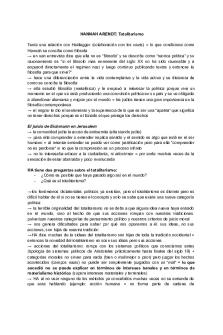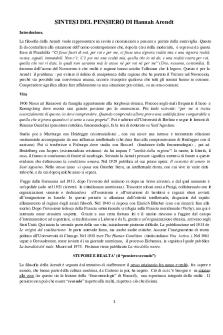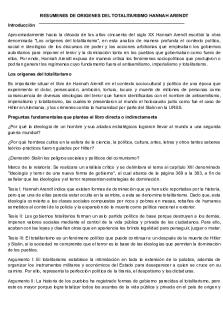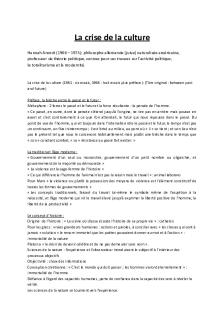We refugees – Hannah Arendt PDF

| Title | We refugees – Hannah Arendt |
|---|---|
| Author | Sara millán |
| Course | Global Studies |
| Institution | Universitat Pompeu Fabra |
| Pages | 4 |
| File Size | 125 KB |
| File Type | |
| Total Downloads | 27 |
| Total Views | 162 |
Summary
Summary of the article written by Hannah Arendt called "We Refugees" in English with the main points....
Description
We refugees – Hannah Arendt Biography of the author Hannah Arendt, born Johanna Arendt (Linden-Limmer, October 14, 1906 - New York, December 4, 1975) was a German philosopher and political theorist, later a nationalized American, of Jewish religion and one of the most influential philosophers of the twentieth century. The deprivation of rights and persecution in Germany of Jews from 1933, as well as their brief imprisonment that same year, contributed to his decision to emigrate. The National Socialist regime withdrew his nationality in 1937, making him stateless, until he obtained American nationality in 1951. Notes on the reading Today, we are witnessing the most massive wave of migrations since the end of the Second World War. There are serious political decisions at stake, and migration has truly become a contemporary global phenomenon that affects us all. Hannah Arendt was an assimilated Jew who managed to escape Hitler’s regime and move to the United States, in order to find shelter and become an American citizen. Her essay, We refugees was published in a small Jewish periodical in 1943. In her essay, Arendt deals with the problems of identity and imposed identity, and shows us what it means to be called a refugee. It is actually a great psychological portrait of a very particular collective, as it depicts what it means to be a wanderer and forced to leave one’s home. Unauthorized violence is occurring nowadays, we call it terrorism, and causing sever consequences. Forcing thousands of innocent people to leave their homes and seek refuge somewhere else. In her essay, Arendt speaks about how difficult it was for her and other Jews to find peace and shelter since it usually meant dealing with others who were not that friendly to newcomers, or it meant assimilating with the majority and losing oneself in the process. In the text, the author always writes in 1st person, plural “We refugees”, as we can see on the title of the text already, since she herself was one. Reading •
In the first place, we don’t like to be called “Refugees”. We ourselves call each other “newcomers” or “immigrants”.
A refugee used to be a person driven to seek refuge because of some act committed or some political opinion held. It is true that they have had to seek refuge, but they committed no acts and most of them never dreamt of having any radical opinion. With them the meaning of the term “refugee” has changed. Now “refugees” are those who have been so unfortunate as to arrive in a new country without means and have to be helped by Refugee Committees.
•
•
•
We are immigrants or newcomers who had left our country because, one fine day, it no longer suited us to stay, or for purely economic reasons. Or to rebuilt our lives” For what there is a need to be very optimistic, so they are. We were told to forgot, and we forgot quicker than anybody ever could imagine.” We were reminded that the new country would become a new home.” In order to forget more efficiently they rather avoid any allusion to concentration camps they experienced in nearly all European countries. Even among ourselves we don’t speak about this past. Instead, we have found a way of mastering an uncertain future.
Still, there was this strong optimism that pushed people forward and believe there was something better waiting form them. But fighting and choosing to survive wasn’t everybody’s decision. Some chose death and committed suicide, giving the illusion of liberty and control. •
• •
•
•
There are those odd optimists among us who, having made a lot of optimistic speeches, go home and turn on the gas or make use of a skyscraper in quite an unexpected way. They seem to prove that our proclaimed cheerfulness is based on a dangerous readiness for death. Brought up in the conviction that life is the highest good and death the greatest dismay, we become witnesses and victims of worse terrors than death –without having been able to discover a higher ideal than life. Thus, although death lost its horror for us, we became neither willing nor capable to risk our lives for a cause. Instead of fighting back, we refugees have got used to wishing death to friends or relatives; if somebody dies, we cheerfully imagine all the trouble he has been saved. Finally many of us end by wishing that we, too, could be saved some trouble, and act accordingly. We are the first non-religious Jews persecuted –and we are the first ones who, not only in extremis, answer with suicide. Perhaps the philosophers are right who teach that suicide is the last and supreme guarantee of human freedom: not being free to create our lives or the world in which we live, we nevertheless are free to throw life away and to leave the world. “Pious Jews cannot realize this negative liberty, they perceive murder in suicide, that is, destruction of what man never is able to make, interference with the rights of the Creator.” It means a blasphemous attack in creation as a whole. Their optimism [of those committing suicide] is the vain attempt to keep head over water. Behind this front of cheerfulness, they constantly struggle with despair of themselves. Finally they die of a kind of selfishness.
All the Jewish people wanted was to live their lives just like anybody else, but for the most absurd reasons – they were denied that right. Arendt writes about the primal force that drives a human being: that is the will to survive. But, for Jews, it meant stripping themselves of their identities. Arendt shows the true face of a refugee, and she tries to stress that people showed little empathy towards the less fortunate. Even receiving help is hard for the ones seeking asylum.
•
If we are saved we feel humiliated, and if we are helped we feel degraded.
•
•
•
•
•
•
•
•
•
We already are so so damnably careful in every moment of our daily lives to avoid anybody guessing who we are, what kind of passport we have, where our birth certificates were filled out - and that Hitler didn’t like us. We try the best we can to fit into a world where you have to be sort of politically minded when you buy your food. “And nobody knows who I am!” Since nobody would treat him as a dignified human being. He learned quickly that in this mad world it is much easier to be accepted as a “great man” than as a human being. The less we are free to decide who we are or to live as we like, the more we try to put up a front, to hide facts and to play roles. (…) It is the same story all over the world, repeated again and again. Expelled form Germany because we are Jews, but in France we are “boches”. In Europe, the Nazis confiscated our property, but in Brazil, we have to pay 30% of our wealth. In Paris, we could not leave our homes after eight o’clock because we were Jews; but in Los Angeles we are restricted because we are “enemy aliens.” Our identity is changed so frequently that nobody can find who we actually are. These unwritten social laws [even those among the Jews], though never publicly admitted, have the great force of public opinion. And such a silent opinion and practice is more important for our daily lives than all official proclamations of hospitality and good will. Very few individuals have the strength to conserve their own integrity if their social, political and legal status is completely confused. Lacking the courage to fight for a change of our social and legal status, we have decided instead, so many of us, to try a change of identity. And this curious behaviour makes matters much worse. The confusion in which we live is partly our own work. Whatever we do, whatever we pretend to be, we reveal nothing but our insane desire to be changed, not to be Jews, All our activities are directed to attain this aim: we don’t want to be refugees, since we don’t want to be Jews. We don’t succeed and we can’t succeed; under the cover of our “optimism” you can easily detect the hopeless sadness of assimilationists. (…) Assimilation did not mean the necessary adjustment to the country where we happened to be born and to the people whose language we happened to speak. We adjust in principle to everything and everybody. But since patriotism is not yet believed to be a matter of practice, it is hard to convince people of the sincerity of our repeated transformations. This struggle makes our own society so intolerant; we demand full affirmation without our own group because we are not in the position to obtain it from the natives. One may be surprised that the apparent uselessness of all our odd disguises has not yet been able to discourage us. If it is true that that men seldom learn from history and from personal experience, which in our case repeated time and again. But remember that being a Jews does not give any legal status in this world. If we should start telling the truth that we are nothing but Jews, it would mean that we expose ourselves to the fate of human beings who, unprotected by any specific law or political convention, are nothing but human beings. I can hardly imagine an attitude more dangerous, since we actually live in a world in which human beings as such have ceased to exist for quite a while; since society has discovered discrimination as the great social weapon by which one may kill men without any bloodshed; since passports or birth certificates,
•
•
•
•
!
and sometimes even income tax receipts, are no longer formal papers but matters of social distinction. It is true that most of us depend entirely upon social standards; we lose confidence in ourselves if society does not approve us, and we are always ready to pay any price in order to be accepted by society. But it is equally true that the very few among us who have tried to get along without all these tricks and jokes of adjustment and assimilation have paid a much more higher price than they could afford: they jeopardized the few chances even outlaws are given in a topsy-turvy world. There have always been Jews who did not think it worth to change their humane attitude and their natural insight into reality for the narrowness of caste spirit or the essential unreality of financial transactions, the pariahs. It is the tradition of a minority of Jews who have not wanted to become upstars, who preferred the status of “conscious pariah.” History has forced the status of outlaws upon both, upon pariahs and parvenous alike. The latter have not yet accepted the great wisdom of Balzac’s: “On ne parvient pas deux fois”; thus they don’t understand the wild dreams of the former and feel humiliated in sharing their fate. Those few refugees who insist upon telling the truth, get in exchange for their unpopularity one priceless advantage: history is no longer a closed book to them and politics is no longer the privilege of Gentiles. Refugees driven from country to country represent the vanguard of their peoples – if they keep their identity. For the first time Jewish history is not separate but tied up with that of all other nations. The comity of European peoples went to pieces when, and because, it allowed its weakest member to be excluded and persecuted....
Similar Free PDFs

We refugees – Hannah Arendt
- 4 Pages

Hannah Arendt - resumen libro
- 2 Pages
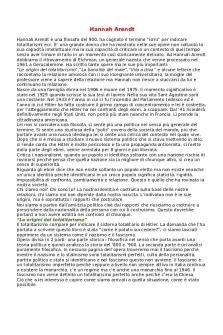
Hannah Arendt riassunto storia
- 6 Pages
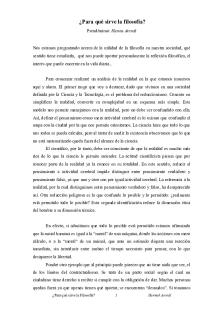
Hannah arendt - asdfg
- 4 Pages
Popular Institutions
- Tinajero National High School - Annex
- Politeknik Caltex Riau
- Yokohama City University
- SGT University
- University of Al-Qadisiyah
- Divine Word College of Vigan
- Techniek College Rotterdam
- Universidade de Santiago
- Universiti Teknologi MARA Cawangan Johor Kampus Pasir Gudang
- Poltekkes Kemenkes Yogyakarta
- Baguio City National High School
- Colegio san marcos
- preparatoria uno
- Centro de Bachillerato Tecnológico Industrial y de Servicios No. 107
- Dalian Maritime University
- Quang Trung Secondary School
- Colegio Tecnológico en Informática
- Corporación Regional de Educación Superior
- Grupo CEDVA
- Dar Al Uloom University
- Centro de Estudios Preuniversitarios de la Universidad Nacional de Ingeniería
- 上智大学
- Aakash International School, Nuna Majara
- San Felipe Neri Catholic School
- Kang Chiao International School - New Taipei City
- Misamis Occidental National High School
- Institución Educativa Escuela Normal Juan Ladrilleros
- Kolehiyo ng Pantukan
- Batanes State College
- Instituto Continental
- Sekolah Menengah Kejuruan Kesehatan Kaltara (Tarakan)
- Colegio de La Inmaculada Concepcion - Cebu
